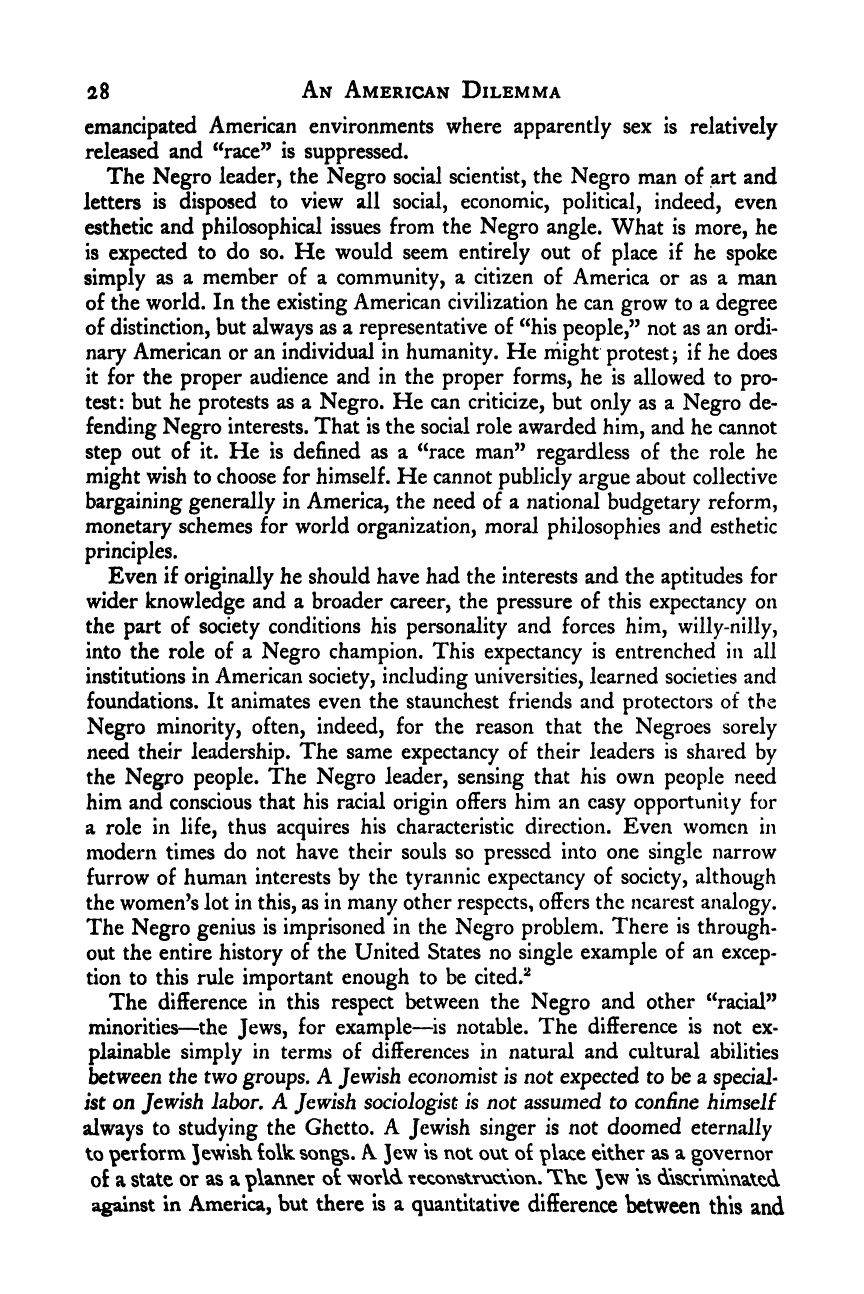Note: Gunnar Myrdal died in 1987, less than 70 years ago. Therefore, this work is protected by copyright, restricting your legal rights to reproduce it. However, you are welcome to view it on screen, as you do now. Read more about copyright.
Full resolution (TIFF) - On this page / på denna sida - I. The Approach - 2. Encountering the Negro Problem - 2. To the Negroes Themselves

<< prev. page << föreg. sida << >> nästa sida >> next page >>
Below is the raw OCR text
from the above scanned image.
Do you see an error? Proofread the page now!
Här nedan syns maskintolkade texten från faksimilbilden ovan.
Ser du något fel? Korrekturläs sidan nu!
This page has never been proofread. / Denna sida har aldrig korrekturlästs.
28 An American Dilemma
emancipated American environments where apparently sex is relatively
released and ^^race” is suppressed.
The Negro leader, the Negro social scientist, the Negro man of art and
letters is disposed to view all social, economic, political, indeed, even
esthetic and philosophical issues from the Negro angle. What is more, he
is expected to do so. He would seem entirely out of place if he spoke
simply as a member of a community, a citizen of America or as a man
of the world. In the existing American civilization he can grow to a degree
of distinction, but always as a representative of “his people,” not as an ordi-
nary American or an individual in humanity. He rhight protest j
if he does
it for the proper audience and in the proper forms, he is allowed to pro-
test: but he protests as a Negro. He can criticize, but only as a Negro de-
fending Negro interests. That is the social role awarded him, and he cannot
step out of it. He is defined as a ^Vace man” regardless of the role he
might wish to choose for himself. He cannot publicly argue about collective
bargaining generally in America, the need of a national budgetary reform,
monetary schemes for world organization, moral philosophies and esthetic
principles.
Even if originally he should have had the interests and the aptitudes for
wider knowledge and a broader career, the pressure of this expectancy on
the part of society conditions his personality and forces him, willy-nilly,
into the role of a Negro champion. This expectancy is entrenched in all
institutions in American society, including universities, learned societies and
foundations. It animates even the staunchest friends and protectors of the
Negro minority, often, indeed, for the reason that the Negroes sorely
need their leadership. The same expectancy of their leaders is shared by
the Negro people. The Negro leader, sensing that his own people need
him and conscious that his racial origin offers him an easy opportunity for
a role in life, thus acquires his characteristic direction. Even women in
modern times do not have their souls so pressed into one single narrow
furrow of human Interests by the tyrannic expectancy of society, although
the women’s lot in this, as in many other respects, offers the nearest analogy.
The Negro genius is imprisoned in the Negro problem. There is through-
out the entire history of the United States no single example of an excep-
tion to this rule important enough to be cited.^
The difference in this respect between the Negro and other ‘‘racial”
minorities—the Jews, for example—^is notable. The difference is not ex-
plainable simply in terms of differences in natural and cultural abilities
between the two groups. A Jewish economist is not expected to be a special-
ist on Jewish labor, A Jewish sociologist is not assumed to confine himself
always to studying the Ghetto. A Jewish singer is not doomed eternally
to perform 5ew‘\sh folk songs. A Jew is not out of place either as a governor
of a state or as a planner of world reconstruction. The Jew Is discriminated
ag^nst in America, but there is a quantitative difference between this and
<< prev. page << föreg. sida << >> nästa sida >> next page >>